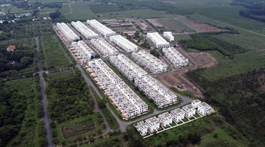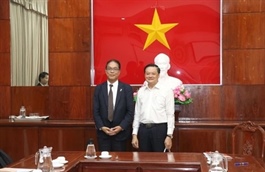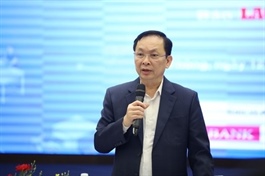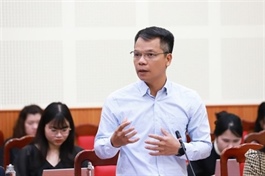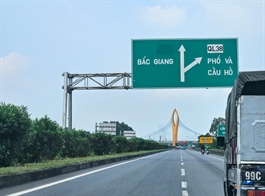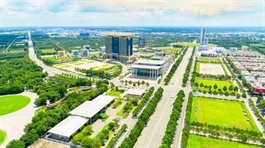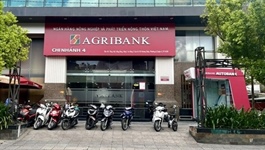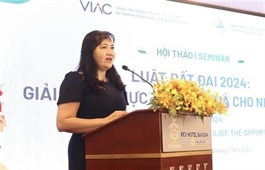Real estate developers pin hopes on eco-IP regulations
Real estate developers pin hopes on eco-IP regulations
Industrial real estate developers are waiting for a new law to open the path for developing greener models of industrial parks.

Long Duc Investment Co., Ltd., the developer of Long Duc Industrial Park (IP) in the southern province of Dong Nai, is working with relevant parties to study plans to build a green and smart IP project. The aim is to improve the efficiency of industrial waste treatment towards zero CO2 emissions, and energy saving.
“We have had working sessions with provincial leaders and the Management Board of Dong Nai Industrial Parks on the proposal to implement a smart and green IP. This not only creates a competitive advantage for the IPs, but also contributes to improving environmental quality for the province’s IPs," said Ishii Hiroyuki, general director of Long Duc Investment.
Amata Long Thanh City Co., Ltd. is also outlining another eco-IP in Dong Nai that will ensure the waste treatment system uses smart technology.
Other industrial infrastructure developers in the area are interested in applying ecological criteria to transform development models, including Suoi Tre IP in Long Khanh and Nhon Trach 6 IP in Nhon Trach district.
While this increase in attention on eco-IPs was initially thanks to 2022's Decree No.35/2022/ND-CP on the management of IPs and economic zones (EZs), the Ministry of Planning and Investment (MPI) this May further proposed developing a specific law on IPs, aiming to create flourishing conditions to build eco-IPs that can attract high-quality investment capital flow. The proposal is awaiting the approval of the government.
According to Vuong Thi Minh Hieu, deputy director of the MPI’s Department for Economic Zones Management at a talk show held by VIR last week, one of the outstanding impacts of the 2022 decree was to encourage the development of new IP and EZ models.
“The decree adds types of specialised IPs, high-tech IPs, specialised zones, and non-tariff zones. Besides that, it supplies regulations to clarify the support and cooperation policies, criteria for identification, incentives, certification, order and procedures for registering for eco-IP certification,” Hieu said.
“At the same time, it specifically stipulates preferential policies for new types of IPs, including regulations on occupancy rate conditions not being applied when considering and approving investment planning for new model IPs,” Hieu added.
More specifics wanted
At the talk show, representatives of industrial real estate developers highly appreciated the expansion of regulations, especially the incorporation of rules on sustainable IPs. However, they consider the rules as an initial basis, opening the path for eco-IPs, and simultaneously emphasising the importance of developing a dedicated IP and EZ law.
“The development of eco-IPs is a mandatory trend, but this model needs a large amount of initial capital. Decree 35 has no specific regulations on the incentives and preferential loans for developers, so they face barriers in mobilising green finance,” said Van Nguyen, associate project manager at real estate company JLL.
The implementation of segments of new model IPs such as land clearance, the development of housing and accommodation for workers, the reuse of treated wastewater, and the installation of the renewable energy system face difficulties due to the overlap of the regulations in other laws, Van said.
“Many foreign investors are impatient when it comes to land clearance and other procedures, and they may look for opportunities in other countries. Thus, having a particular law on IPs and EZs to avoid overlap in regulations is an expected requirement,” Van added.
Pham Hong Diep, chairman of the board at Shinec, investor of Nam Cau Kien IP in Thuy Nguyen district of Haiphong, said industrial real estate developers like Shinec expect a new law soon.
“It would integrate the particular regulations to develop sustainable IPs as well as apply the circular economic model at parks so that there will not be overlap or dependence on other laws,” Diep said. “The business community is committed to accompanying the MPI and relevant authorities during the process to build the law and will contribute opinions based on practical experience to ensure transparency and objectivity.”
Boosting convenience
According to Diep, Nam Cau Kien IP has been applying a circular economy model since 2018. After the government issued Decree 35 and the Law on Environmental Protection, Nam Cau Kien identified changes to make and has met all the criteria for an eco-IP stated in Decree 35, as well as the criteria set for circular economy development.
“Decree 35 is just a sub-law document, thus when implementing segments of eco-IPs and circular economic models in IPs, industrial real estate developers face many barriers relating to the other laws. For example, the reuse of treated waste is regulated by the Law on Environmental Protection, the reuse of treated wastewater’s regulations depend on the Ministry of Agriculture and Rural Development,” said Diep.
According to Diep, the construction of housing and accommodation for workers is also a problem. A housing area based on eco-IP standards need many utilities, including convenience for workers.
“The problem is that the Law on Housing regulates that a room for 6-8 people in a dormitory just has one toilet, which is extremely inconvenient,” Diep explained. “However, industrial real estate developers can’t do anything because of the overlap with the regulation of the Law on Housing. Housing areas in a few IPs are often abandoned due to failure to meet workers' demands.”
Since 2020, the MPI has coordinated with the United Nations Industrial Development Organization (UNIDO) to implement an eco-IP intervention scheme, with a total budget of $1.82 million, which has been piloted in Ho Chi Minh City, Can Tho, Dong Nai, Danang, and Haiphong.
Among IPs selected for project intervention were Amata IP, DEEP C IP, and Hiep Phuoc IP. Technical support was also provided to other IPs involved in a previous UNIDO initiative.
Between 2015 and 2019, the MPI, UNIDO, and other donors worked to pilot eco-IP models in Ninh Binh, Danang, and Can Tho. As a result, 72 businesses implemented more than 900 energy-saving and clean production solutions, which helped them to save $3.3 million and simultaneously cut 32 kilotonnes of CO2 annually.



